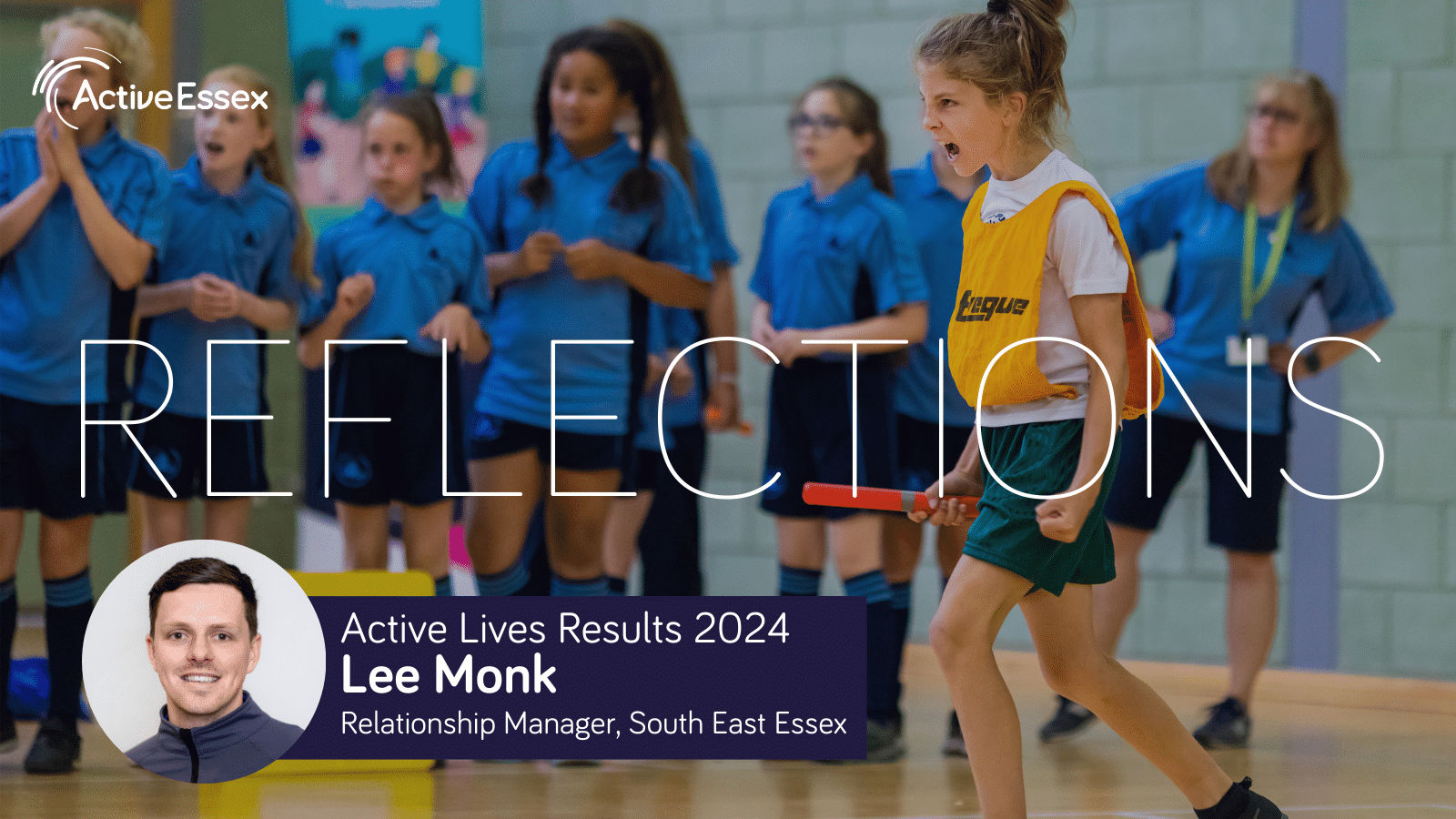For many, December is an opportunity for reflection, looking back, looking forward and I am no different. Every early December, I really look forward to seeing the results in the annual Active Lives Children and Young People Survey, but rarely do I look forward to sharing the headlines with our team and wider partners.
The latest report shared that 51.5% of children in Greater Essex are now classed as “active.” This represents an increase of 1.9% of children classed as active and a 2.5% decrease in less active children in Greater Essex. It was the first time since the Active Lives Survey begun, that more than 1 in 2 children reached the Chief Medical Officer guidelines for physical activity. Across Greater Essex, we have seen a steady increase in the right direction since the COVID-19 pandemic. Whist that might paint a positive picture, the stark reality is, over 120,000 children in Greater Essex alone are not moving enough and are therefore not gaining access to the wonderful benefits that comes with an active lifestyle, be it better physical health, stronger mental wellbeing, individual resilience, a greater trust in others or increased academic attainment.
The data also shows worrying signs that inequalities are widening and young people across the country that have the most to gain from an active lifestyle, are finding it harder than ever before to do so. Black (42%) and Asian (43%) children and young people, and those from the least affluent families (45%) are still less likely to play sport or be physically active than the average across all ethnicities and affluence groups. Girls (45%) are also less likely to be active than boys (51%). We are now also seeing the repercussions of the COVID-19 pandemic negatively impacting children’s relationships with movement, particularly children in KS2.
It has never been clearer to me that if we want to raise activity levels and tackle the stubborn inequalities that prevent children and young people from an active lifestyle, that we as a system need to do all we can to ensure that all children have positive early experiences of physical activity and are given the best chance to develop healthy and meaningful relationships with movement. The Active Lives Survey tells us that children that report 3 or more positive attitudes towards physical activity are twice as likely to be active than those that do not.
The Physical Literacy Consensus Statement for England, highlighted the importance of physical literacy in providing positive experiences of movement and physical activity for all.
The statement helped me reflect on my own relationship with movement and I have come to realise how fortunate I am. I played organised sport, had access to good teachers and coaches and now have friends for life from playing sport which I loved. Throughout my childhood parents and grandparents taxied me all around Essex, I can remember being cramped in the middle of the car going to away fixtures so everyone could watch me play. I was encouraged by my family to do my best, but I never felt pressured to be better. My favourite memories however are not from organised sport or activities, they are from informal play, with my family and friends. I grew up in rural Maldon, a three-minute walk from a small park and spent most of the daylight hours of my childhood outside playing with friends and when I was little, I can remember waiting desperately for my dad to get home from work to play with me which he did every time for hours on end.
These experiences all played a part in my relationship with movement and have certainly influenced me into my adulthood, how I think, feel, and connect with it. I now value the importance of galvanising the system to better understand, develop, design, and provide the experiences, places and activities that provide fun, safe, inclusive opportunities and, support children to have better outcomes.
This will form part of our renewed Implementation Plan for 2025, of which Positive Experiences for Children and Young People will be a key priority. We will build on the important work of the Move With Us Campaign which has been our mechanism to drive physical literacy through and we will work collaboratively with others who share our vision to make change happen.
Positively, we are not starting from scratch, there are strengths to build from and there are good reasons to be optimistic.
- Essex Activate, delivered by locally trusted organisations, is tackling inequalities and raising positive attitudes in communities. Through the programme, community organisations will continue to develop trust and meaningful relationships with children and families across Essex into 2025.
- Our Active Schools, School Games, Early Years and Girls Football Programmes are developing equity of opportunity and experiences across education settings and will be refreshed to ensure we are using our resource proportionately to the greatest need.
- The work of the Active Essex Foundation is growing to support more young people into meaningful activities to support their mental wellbeing and divert at risk young people away from unhealthy behaviours.
- More senior leaders and place-based partnerships are prioritising shared efforts to develop positive experiences for young people in their communities and create three-year plans through Sport England’s deepening and expansion programmes.
- And the backbone of our sector, volunteers and clubs up and down the county continues to work tirelessly to provide fun and meaningful experiences of sport and physical activity for all that access it.
Despite the immense challenge the system faces to create the conditions for better outcomes for children and families, we remain laser focused and stubborn on our vision. How we get there may change, adapt, and flex as the world around us does at pace, just as our own relationship with movement might over the course of our lives.




